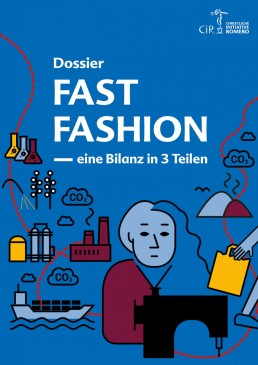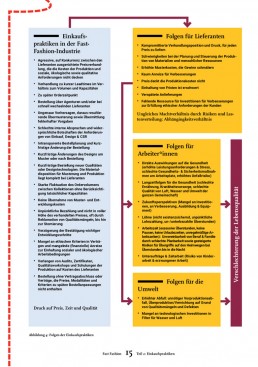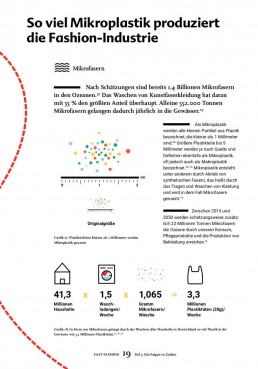

At the beginning of this year, Prof. Friederike von Wedel-Parlow and Sarah Maria Schmidt were able to conduct extensive research specifically on these questions relating to purchasing practices in the fast fashion industry.
The findings have now been published in the form of two articles in the "Dossier: Fast Fashion - Eine Bilanz in 3 Teilen", in addition to a study on working conditions in Sri Lanka by the Christian Initiative Romero e.V. The research was supported by Magdalena Schaffrin as well as by interviews with experts from sustainability departments, NGOs, supply chain consulting and organizations seeking improved purchasing practices through various approaches. The study is aimed at the end consumer and tries to break down the phenomena to an understandable level.
The article "Part 2: Purchasing Practices" focuses on the different purchasing practices in fast fashion with an emphasis on the social impact on workers. The creation of fair and improved purchasing practices is a topic that requires constructive discussions and joint solutions from the industry for which the article identifies options for action. The article shows the role and function of purchasing, provides definitions and outlines the ordering process to give a clear picture of different purchasing practices. The question of responsibility for the indirect and direct effects on workers is raised, but the article also shows effective approaches and possibilities for improved and more sustainable purchasing practices. In order to make the complexity of the topic more tangible, various experts* from the industry give different perspectives and points of view on this highly complex issue.

"Part 3: The consequences in figures" gives a broad overview of the actual global costs of the fashion industry, thus making the quantified social and environmental effects visible. The sometimes unimaginably high consumption levels were brought into comprehensible comparisons and visualized in information graphics. The main topics of this inventory analysis are among others consumption in Germany, water, oil, greenhouse gases, use of chemicals, land use, biodiversity, waste production, microplastics and social issues.

The research also highlighted the urgency for Beneficial Design to stimulate the fashion industry's transformative power to bring about positive cultural change through a combination of innovation, quality and beauty, so that fashion, textiles and products touch, move and create identity. Because fashion and design are driving forces for change far beyond our own industry.
Click here to download Part 2: Purchasing Practices
Our sincere thanks go to the experts and discussion partners
Dr. Reiner Hengstmann (Go4more), Dr. Frank Hoffer (ACT Organisation), Kate Larsen (SupplyESChange Initiative, Kate Padget-Koh (Love Couture Asia), Lavinia Muth (ArmedAngels, Social Fashion Company GmbH), Maik Pflaum (CIR), Prof. Marsha Dickson (Better Buying Organisation)
as well as Magdalena Schaffrin (Kalaidoscope/Neonyt) for their support.
Thank you also to the editor:
Christliche Initiative Romero e.V. (CIR) Schillerstraße 44a · D-48155 Münster Webseite: www.ci-romero.deE-Mail: cir@ci-romero.deTelefon +49 (0) 251 / 67 44 13 – 0
Editorial office: Isabell Ullrich (V.i.S.d.P.), Maik Pflaum, Kirsten Clodius (alle CIR)
Authors: Part 1: Rajitha Anuradha Somarathna and Lakmali Hemachandra (both Shrmabhimani Kendraya); Part 2 and 3: Sarah Maria Schmidt, Prof. Friederike von Wedel- Parlow (Beneficial Design e.V. ) with the support of Magdalena Schaffrin.
Editor: Dietmar Damwerth
Layout and illustrations: Nikola Berger | nikobe.net
The graphics in this dossier can be used under the Creative Commons License CC-BY-NC-SA 4.0
Fast Fashion – An assessment in three parts
The actual social and ecological effects of the global mass consumption of cheap and fast fashion are often difficult to grasp in their complexity. On the one hand, the over-consumption of clothing, its careless manner of production, and the associated high consumption of resources with its impact on the environment and ecosystems, presents us with major hurdles. On the other hand, the purchasing practices of brands, i.e. the operational business of companies, have unfavorable effects on the everyday life and health of people in the production countries. But what do these practices look like in concrete terms, what impact do they have on working conditions and what options are there for improvement?
ClientChristliche Initiative Romero e.V. (CIR)ServicesResearch and articles, data preparationTeamBeneficial Design e.V. (Sarah Maria Schmidt, Friederike von Wedel-Parlow) and Magdalena SchaffrinLinkwww.ci-romero.de
